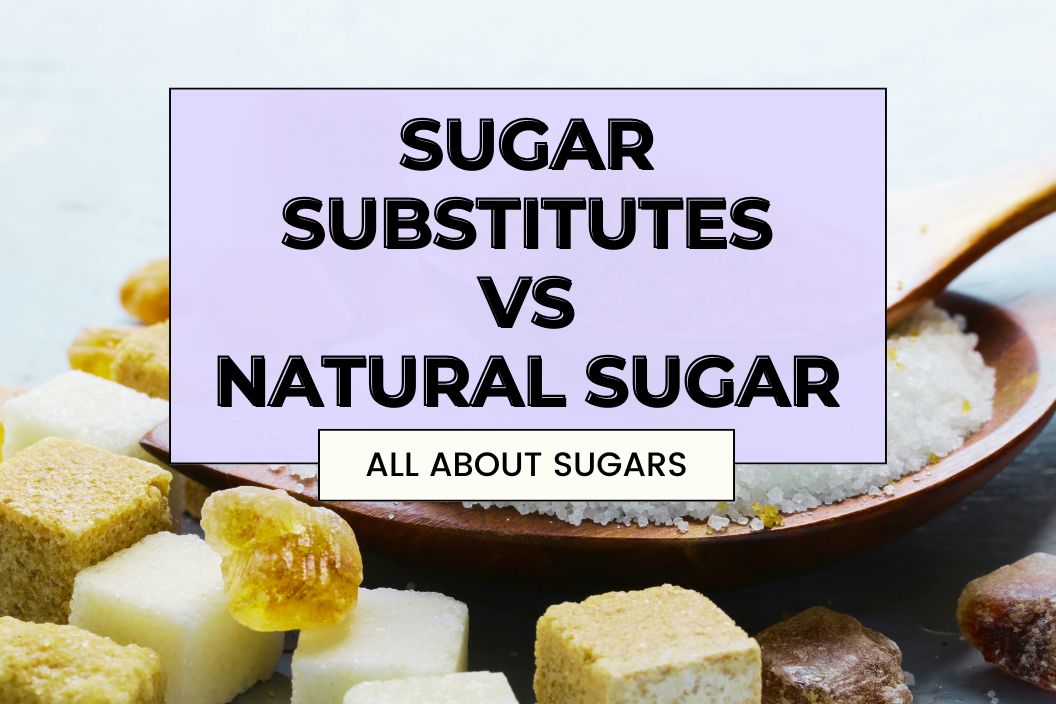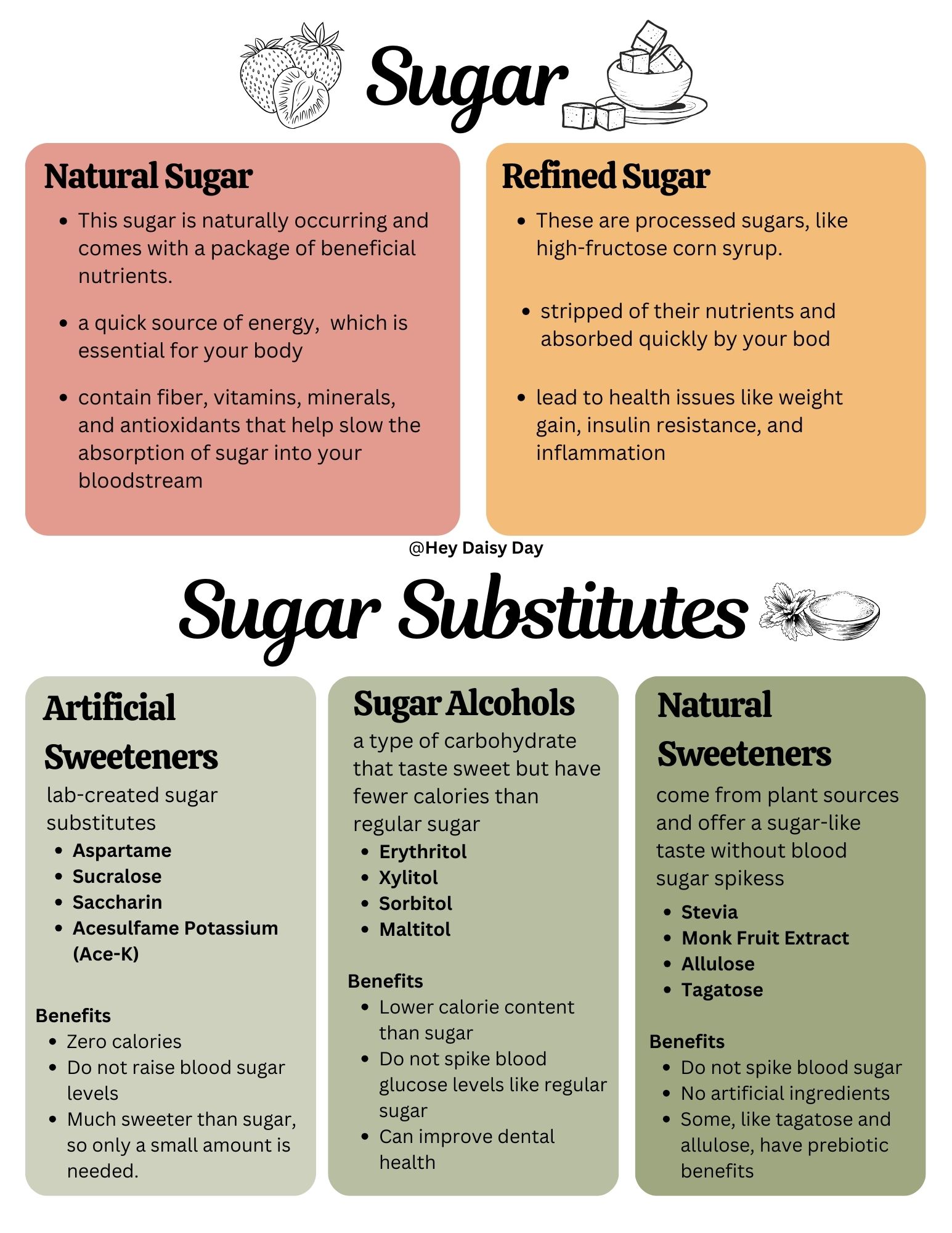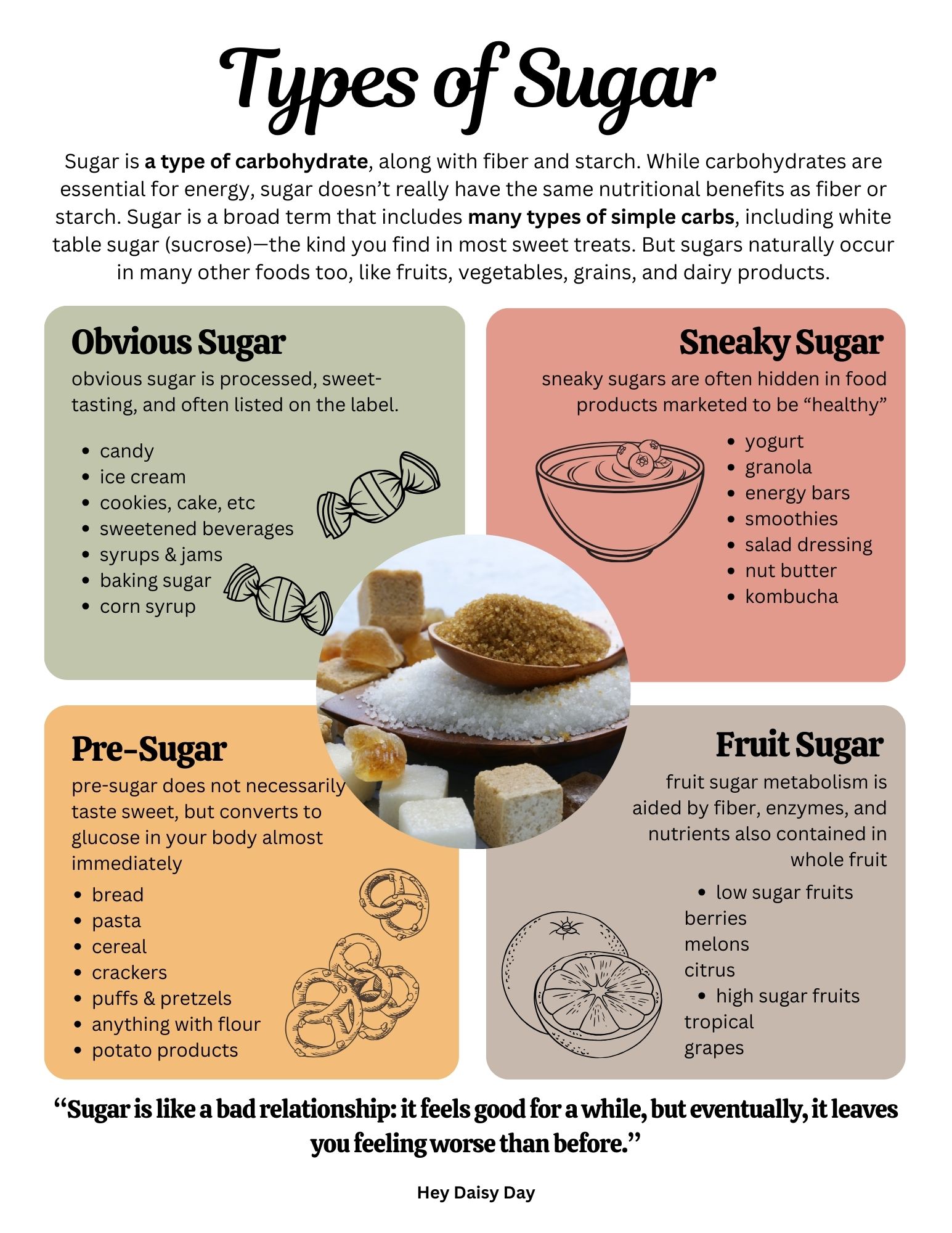
We hear it all the time—"cut out sugar!"
But when it comes to your health, not all sugar is created equal, and the idea of a sugar-free diet can be a bit confusing. Let’s break down the truth about sugar, sugar substitutes, and whether sugar-free really means better for women in their 30's and 40+'s.
What is Sugar?
Sugar is a type of carbohydrate, along with fiber and starch. While carbohydrates are essential for energy, sugar doesn’t really have the same nutritional benefits as fiber or starch. Sugar is a broad term that includes many types of simple carbs, including white table sugar (sucrose)—the kind you find in most sweet treats. But sugars naturally occur in many other foods too, like fruits, vegetables, grains, and dairy products.
Names of Sugar You May Come Across:
-
Fructose (found in fruits and honey)
-
Galactose (found in dairy)
-
Glucose (found in fruits and veggies)
-
Lactose (found in dairy)
-
Maltose (found in malted grains)
Natural vs. Refined Sugar
There’s a big difference between natural sugars and refined sugars:
-
Sugar from Whole Foods (like fruits and vegetables):
This sugar is naturally occurring and comes with a package of beneficial nutrients. Whole foods, such as fruits and vegetables, contain fiber, vitamins, minerals, and antioxidants that help slow the absorption of sugar into your bloodstream. The fiber in these foods acts as a buffer, preventing the rapid blood sugar spikes that often leave you feeling drained and sluggish. -
Refined Sugar: These are processed sugars, like high-fructose corn syrup, which are stripped of their nutrients and absorbed quickly by your body. This can lead to insulin resistance, weight gain, and other health problems.
At the molecular level, both natural sugar (from whole foods) and refined sugar are made up of sugars like glucose and fructose. But how your body handles them is very different.
Natural Sugar found in fruits and veggies comes with fiber, vitamins, and minerals that help slow down sugar absorption. Because of this, it's harder to overconsume, and your body doesn’t get hit with quick blood sugar spikes.
Refined Sugar, on the other hand, is processed and absorbed fast, causing those rapid sugar spikes. It's also easier to consume a lot because it's added to many processed foods and drinks.
So while the sugar molecules are the same, natural sugar is much better for your body because it comes with extra nutrients and is harder to overeat.

Are Sugar Substitutes a Healthier Alternative?
Sugar substitutes include artificial sweeteners, sugar alcohols, and natural sweeteners. But are they really a good choice for your diet? Let's find out.
1. Artificial Sweeteners: Super Sweet & Calorie-Free
Artificial sweeteners are lab-created sugar substitutes that provide intense sweetness without the calories of regular sugar. They are often used in diet products to help reduce sugar intake while maintaining a sweet taste. Because they are much sweeter than sugar, only a tiny amount is needed.
Where You’ll Find Them:
- Diet sodas and sugar-free drinks
- Sugar-free gum and candy
- Low-calorie protein bars and shakes
- Packaged “light” or “zero-sugar” foods
Common Artificial Sweeteners & Their Characteristics:
- Aspartame – Around 200 times sweeter than sugar, found in diet sodas and sugar-free gum. Not heat-stable, so it’s not ideal for baking.
- Sucralose – About 600 times sweeter than sugar, commonly sold as Splenda. It is heat-stable, making it a popular sugar substitute for baking.
- Saccharin – One of the oldest artificial sweeteners, 300–400 times sweeter than sugar. Found in pink packets like Sweet’N Low, but has a slightly bitter aftertaste.
- Acesulfame Potassium (Ace-K) – 200 times sweeter than sugar, often blended with other sweeteners to improve taste. Used in sugar-free drinks and baked goods.
Pros & Cons of Artificial Sweeteners
✅ Pros:
- Zero calories, making them a popular choice for weight management.
- Do not raise blood sugar levels, making them diabetic-friendly.
- Much sweeter than sugar, so only a small amount is needed.
❌ Cons:
- Some people experience a bitter or chemical aftertaste.
- Can alter gut bacteria, potentially impacting digestion and metabolism.
- Some studies suggest they may increase cravings for sweet foods, leading to overeating.
💡 Tip: If you’re looking for a zero-calorie sweetener with fewer concerns, monk fruit or stevia may be better natural alternatives.
2. Sugar Alcohols: The Hidden Ingredient in "Sugar-Free" Foods
Sugar alcohols are a type of carbohydrate that taste sweet but have fewer calories than regular sugar. Despite the name, they do not contain ethanol (alcohol) and are safe for consumption. They are commonly used in "sugar-free" and "low-carb" products because they provide sweetness without significantly raising blood sugar levels.
Where You’ll Find Them:
- Sugar-free gum and mints
- Protein bars
- Keto snacks and low-carb desserts
- Diet ice creams
- Sugar-free candies
Common Sugar Alcohols & Their Characteristics:
- Erythritol – Nearly calorie-free, erythritol is a popular sugar substitute in keto products. Unlike other sugar alcohols, it doesn’t typically cause digestive distress because the body absorbs it but doesn’t metabolize it.
- Xylitol – Found in sugar-free gum and toothpaste, xylitol is great for dental health but highly toxic to dogs. It has a similar sweetness to sugar and a cooling effect in the mouth.
- Sorbitol – Less sweet than sugar and often used in sugar-free candies and mints. It can have a laxative effect in large amounts.
- Maltitol – Very similar to sugar in taste and texture, maltitol is used in sugar-free chocolates. However, it has a higher glycemic impact than other sugar alcohols and can still raise blood sugar levels.
Pros & Cons of Sugar Alcohols
✅ Pros:
- Lower calorie content than sugar (typically 1-3 calories per gram vs. sugar’s 4 calories per gram).
- Do not spike blood glucose levels like regular sugar, making them a better option for diabetics.
- Can improve dental health (especially xylitol) by reducing the risk of cavities.
❌ Cons:
- Can cause bloating, gas, and digestive discomfort when consumed in large amounts. This is because they are fermented by gut bacteria, leading to gas production.
- Some, like maltitol, still raise blood sugar levels more than others.
- Xylitol is extremely toxic to dogs and can cause severe health issues if ingested.
💡 Tip: If you're sensitive to sugar alcohols, start with small amounts and see how your body reacts. Erythritol is usually the easiest to tolerate!
3. Natural Sweeteners: The Best of Both Worlds?
Natural sweeteners (Also known as novel sweeteners) come from plant sources and offer a sugar-like taste without blood sugar spikes. They are popular alternatives to artificial sweeteners and sugar alcohols, especially for those looking for a more natural option.
Where You’ll Find Them:
- Keto and low-carb snacks
- Sugar-free syrups and drinks
- Protein powders
- Baking and cooking as a sugar substitute
Common Natural Sweeteners & Their Characteristics:
- Stevia – Extracted from the stevia plant, it is much sweeter than sugar but has a slightly bitter aftertaste. Often blended with erythritol to improve taste.
- Monk Fruit Extract (monk fruit sweeteners) – A fruit-derived sweetener with zero calories and no blood sugar impact. It tastes the closest to regular sugar and is often mixed with other sweeteners.
- Allulose – A rare sugar found in figs and raisins. It tastes like real sugar but has minimal impact on blood glucose. It is not a sugar alcohol and does not typically cause digestive distress.
- Tagatose – Found in dairy, this low-calorie sweetener is gut-friendly and has prebiotic effects that may support digestion.
Pros & Cons of Natural Sweeteners
✅ Pros:
- Do not spike blood sugar, making them great for diabetics and those on low-carb diets.
- No artificial ingredients or chemical processing.
- Some, like tagatose and allulose, have prebiotic benefits that support gut health.
❌ Cons:
- Some people experience a bitter or cooling aftertaste, especially with stevia.
- Monk fruit and stevia are often mixed with fillers like maltodextrin, which can affect blood sugar.
- Can be expensive compared to regular sugar or artificial sweeteners.
💡 Tip for Women Over 35: Monk fruit and stevia are great choices, but they should be used in moderation. If you prefer a sweetener that tastes closest to sugar, allulose is a great option with minimal impact on blood sugar and digestion.
How Much Sugar Should You Have?
The American Heart Association recommends that women limit their intake of added sugar to 6 teaspoons (about 25g) per day. It can be tricky, though, since added sugar hides in a lot of food items you wouldn’t expect.
Hidden Sugars to Watch Out For:
-
Salad dressings
-
Flavored yogurts
-
Granola bars
-
Canned soups
-
Tomato sauce
What Does 25g of Sugar Look Like?
-
1 can of soda (12 oz): 39g of sugar
-
1 medium banana: 14g of sugar
-
1 tablespoon of honey: 17g of sugar
-
1 cup of low-fat yogurt: 17g of sugar
Is a Low-Sugar Diet Better for Weight Loss?
While cutting back on added sugar can help with weight loss, replacing it with artificial sugars or diet drinks may not be the healthiest alternative. Studies have shown that people who consume artificial sugars often crave more sugary foods, making it harder to maintain a balanced diet.
The Sugar and Gut Health Connection
New research suggests that excessive sugar consumption negatively impacts gut health by disrupting the balance of beneficial bacteria. This can lead to digestive issues, inflammation, and even increased cravings for sugar. On the other hand, natural sources of sugar, when consumed in whole foods like fruit, can actually support gut health by providing prebiotic fiber.
Meal Ideas to Help Balance Sugar Intake
Here’s a daily meal plan idea with ~120g protein and ~25g sugar, balancing protein and natural sugars while keeping meals satisfying and nutritious.

Breakfast: Scrambled Eggs with Cottage Cheese & Berries
- 3 large eggs → 18g protein
- ¼ cup cottage cheese (2% fat) → 7g protein
- ½ cup mixed berries → 6g sugar, 0.5g protein
- 1 tbsp chia seeds → 2g protein
Total: 27.5g protein, 6g sugar
Snack: Protein Smoothie
- 1 scoop whey or plant-based protein (unsweetened, vanilla flavor) → 25g protein
- ½ medium banana → 7g sugar, 0.5g protein
- 1 tbsp almond butter → 3.5g protein
- ½ cup unsweetened almond milk → 0g sugar
Total: 29g protein, 7g sugar
Lunch: Grilled Chicken Salad with Avocado & Olive Oil Dressing
- 4 oz grilled chicken breast → 32g protein
- 2 cups leafy greens (spinach, arugula, or kale) → 2g protein
- ½ avocado → 1g protein
- 1 tbsp olive oil + lemon juice → 0g sugar
Total: 35g protein, 0g sugar
Snack: Greek Yogurt with Walnuts
- ¾ cup plain Greek yogurt (nonfat) → 16g protein
- 1 tbsp chopped walnuts → 1g protein
- ½ tsp cinnamon → 0g sugar
Total: 17g protein, 0g sugar
Dinner: Grilled Salmon with Roasted Brussels Sprouts & Sweet Potato
- 4 oz grilled salmon → 25g protein
- ½ cup roasted Brussels sprouts → 2g protein
- ½ cup roasted sweet potato → 6g sugar, 1g protein
Total: 28g protein, 6g sugar
Final Thoughts: Sugar Isn’t the Enemy
Sugar is often misunderstood. Too much refined sugar can indeed lead to health problems like insulin resistance, metabolic syndrome, and weight gain. However, natural sugars found in fruits, vegetables, and whole foods come with nutrients that benefit your body.
The key is moderation—opt for natural sources of sugar, limit added sugars, and experiment with sugar alternatives if needed. But remember: when it comes to your health, the best approach is one that makes you feel your best.
Stay mindful of your sugar intake, and remember, a healthy lifestyle is about balance, not deprivation!




